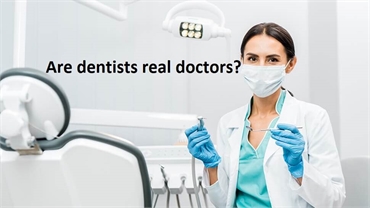Are dentists doctors?
August 03, 2022

A dentist is considered a doctor of the mouth. They have healthcare training and licenses. And patients and staff address a dentist as “doctor.” But do they qualify as real doctors? Some people view dentistry as a medical practice while others do not. Why is dentistry separate from medicine?
Formal Training
General dentists complete three to four years in undergraduate training before moving on to four additional years of dental school. Then, in order to practice, they must pass a national written exam as well as any regional clinical licensing exams. This is similar to the training timeline for medical doctors. And just like medical doctors, dentists must have additional training to specialize in the field and must meet continuing education requirements.
Upon finishing their education, a dentist does receive a type of medical degree. A dentist trains to become a Doctor of Dental Surgery (DDS), a Doctor of Medicine in Dentistry (DMD), or a Doctor of Dental Medicine (DDM). And dentists who have a DDS, DMD, or DDM all have the exact same education with the same curriculum requirements. The labels are interchangeable and there is no difference in the degrees. It is simply the university that determines the name of the degree awarded. Thus, regardless of demarcation, the dentist does technically hold the title of doctor based on their degree. So why the separation?
Dentists are highly trained in pathology, pharmacology, and the oral-systemic health relationship. This training goes beyond mere periodontal disease and oral cancer. Any time the dentist treats or restores a tooth, they are technically performing surgery on the hard body structures of the mouth. It isn’t something a patient should leave to anybody without a doctoral level of training. But too often, dentists are not treated as medical specialists.
Doctor vs Dentist
Historically, the “father of medicine,” Hippocrates wrote extensively on subjects like dental decay and gum disease which he thought to be as elemental to medicine as fractures, wounds, and lung disease. And even during the renaissance and enlightenment physicians like Francis Imlach, John Hunter, and Pierre Fauchard all approached dentistry with a blend of medicine, biology, and physiology. But the separation between dentistry and medicine began to be cemented in the 18th and 19th centuries with the foundation of medical schools.
Unfortunately, the modern medical community has drawn a hard line between the mouth and the body. And dentistry and medicine have an unnatural professional separation. Doctors are doctors, and dentists are dentists. Having dental insurance is one thing, and health insurance is another. A dentist doesn’t ask if you are exercising, and a physician doesn’t ask if you are flossing. If a patient went to a family physician for a cyst in the jaw, abscess tooth, or impacted wisdom tooth they would send that patient to a dentist. Oral care is decidedly divorced from physician networks, payment systems, and medical records. This separation can lead to real consequences. Are patients suffering because of this gap between dental care and medical care?
The oral cavity is an important gateway to the rest of the body. Many underlying health conditions have strong links to oral health. And systemic disease like diabetes, heart disease, and kidney disease often presents within the mouth first. Dentists can spot early signs of health issues and help prevent harmful situations from occurring. They are the first line of defense. And dentists are often faced with life-threatening situations in their daily work. So no, dentists are not considered medical doctors. But patients should esteem their dentist a little more and make sure to share their health history with their dental clinician.

